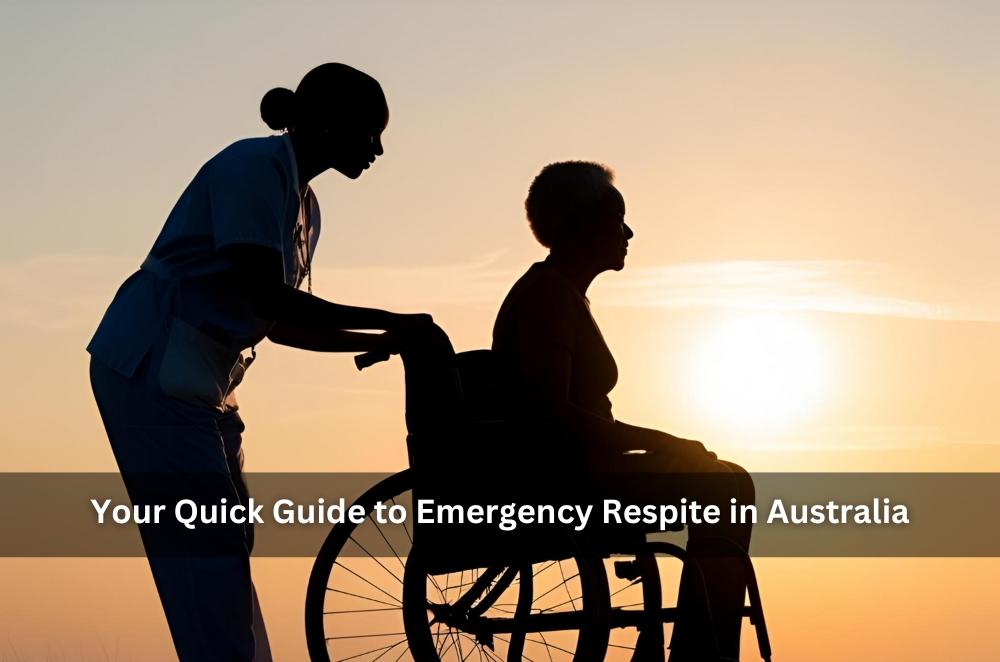Your Quick Guide to Emergency Respite in Australia

When you’re the one holding things together day after day, the idea of someone stepping in — even temporarily — can feel unfamiliar. But sometimes, you don’t get a choice. Illness, stress, or unexpected life events hit hard and fast. That’s when emergency respite care becomes more than just a service — it becomes a backup plan you didn’t know you needed.
A few years ago, I was caring for my uncle after his stroke. We had our routine. It was working — until I got hit with a chest infection that knocked me flat. Couldn’t lift him. Could barely get out of bed. In the middle of that chaos, a local support worker introduced me to respite services for carers, and just like that, someone else was able to step in. I could rest without guilt, knowing he was in safe hands.
That space? It didn’t feel like giving up. It felt like breathing again.
What does emergency respite actually involve?
Emergency respite is one of those things you hope you never need — until you really do. It’s temporary care arranged quickly, often on short notice, when the main carer suddenly can’t keep up their role. It could be an accident. It could be burnout. Could be anything, really.
What’s offered will depend on location and circumstances, but most emergency respite includes:
-
Someone is coming into the home to take over for a while
-
A short stay for the person you care for at a local facility
-
Day programs that provide care while you catch your breath
-
Overnight services for immediate coverage
The point isn’t perfection — it’s support that shows up when things go sideways. Whether you need a few hours or a few nights, the goal is to make sure no one gets left without care.
And it’s not just about physical breakdown. Sometimes it’s emotional, too. Panic. Sleep deprivation. Pure overwhelm. Emergency respite makes space for you to get grounded again.
How carers can access short-term support in a crisis
It’s easy to push through, to convince yourself you’ll figure it out. But if something sudden comes up, knowing how to act — without scrambling — is powerful. It’s worth understanding what short-term respite care is, even if you’re not in crisis yet.
Here’s when short-term care usually kicks in:
-
If you’re suddenly hospitalised or need treatment
-
If the person you care for becomes unsafe at home
-
If there’s been a family emergency, accident, or loss
-
When mental or emotional strain becomes unmanageable
Best tip? Keep basic info ready — like medications, routines, and behaviours. That way, if something happens, you’re not starting from scratch.
The types of support available across Australia
What “respite” looks like depends a lot on where you live and what the person you’re caring for needs. In some regions, options are wider. In others, you might need to work with what’s available. But one thing’s certain: having a general picture helps.
You’ll come across common categories again and again. A clearer breakdown of the types of respite care in Australia gives you a handle on what might apply to your specific setup.
Here are the typical formats:
-
In-home support where a carer comes to your home for a few hours or overnight
-
Community programs that offer structured activities and supervision
-
Residential respite in aged care or disability accommodation, for a few nights or more
Some places even offer pop-up or mobile respite — great for regional areas. And if you’re in a tight spot, explaining your situation clearly helps coordinators find what fits best.
Remember, the goal isn’t to replace you. It’s to make sure someone’s there when you can’t be.
Emergency care and the NDIS: what to understand
Things get trickier when you’re navigating systems like the NDIS. There’s funding, providers, service bookings — all of it can feel like too much when you’re already stretched thin. Still, in many cases, families can use available supports without jumping through too many hoops.
Some carers don’t realise that emergency help can be covered. If the person you're caring for is on the NDIS, understanding how to manage and navigate NDIS respite options gives you room to act quickly without second-guessing everything.
Short-Term Accommodation (STA) under the NDIS is sometimes used for emergency situations. It doesn’t always require a plan review — sometimes it’s just a matter of available budget and fast coordination. If you have a Support Coordinator, they’re often your first call. If not, contacting the provider directly can work too.
What matters most? Acting early, not perfectly. Have a plan — even a rough one — before things tip into crisis mode.
Why using emergency respite isn't giving up
There’s this thing that happens with carers — this pressure to “push through,” no matter how rough things get. Like asking for help somehow means you’re not doing enough.
But here’s the truth: using respite is part of caring. It’s the decision to step back, just long enough to come back stronger.
Emergency respite exists for a reason. It’s there so you can:
-
Avoid crashing when the load gets too heavy
-
Protect the long-term relationship you have with the person you’re caring for
-
Give yourself space to feel like a person again, not just a support system
-
Reset before resentment or exhaustion takes over
Sometimes, the person you’re supporting benefits too. A change of scene, different faces, a slightly different routine — all of it can add value, even short-term.
There’s no shame in needing rest. The shame would be in pretending you never do.
Final thoughts
You don’t always get to plan when things go wrong. Life throws curveballs. And as a carer, you’re often the one catching them all, without gloves. That’s why emergency respite matters. It’s not a luxury. It’s not weakness. It’s sa trategy.
Whether it’s for a night, a weekend, or just long enough to stop spinning, these services exist to hold space for you and the person you care for. Use them.
Because sometimes stepping away — even briefly — is the strongest move you can make.








